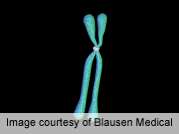(HealthDay)—For men aged 50 to 75 years with acute coronary syndrome, short telomeres are independently associated with worse prognosis, according to a study published in the Feb. 1 issue of The American Journal of Cardiology.
Jose-Angel Perez-Rivera, M.D., from the University Hospital of Salamanca in Spain, and colleagues assessed the prognostic value of telomere length, measured by quantitative polymerase chain reaction in peripheral blood leukocytes of 203 men admitted with acute coronary syndrome. The men were classified into two groups according to age: 50 to 75 years, and older than 75 years. Patients underwent more than 600 days of clinical follow-up and a prognostic combined event was defined.
The researchers found that for men aged 50 to 75 years, those with short telomeres had significantly worse prognosis (P < 0.05), but this association was not seen for men aged older than 75 years (P = 0.91). For men aged 50 to 75 years, Cox analysis confirmed short telomeres as an independent prognostic risk factor.
"In conclusion, telomere length is a good predictor of cardiovascular prognosis in men admitted for acute coronary syndrome, but this relation depends on the chronological age of the population studied," the authors write.
More information:
Abstract
Full Text (subscription or payment may be required)
Journal information: American Journal of Cardiology
Copyright © 2014 HealthDay. All rights reserved.





















